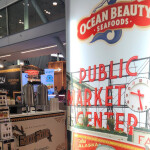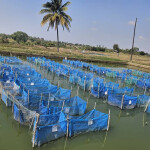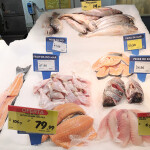While bold steps have been taken to tackle illegal, unreported and unregulated (IUU) fishing in the last five years, it still remains one of, if not the biggest barrier to establishing sustainable fisheries on a global scale. The European Commission estimates the annual cost of IUU to still be between EUR 10 billion (USD 11.3 billion) and EUR 18 billion (USD 20.3 billion), involving between 11 and 26 million metric tons (MT) of seafood products. Other international bodies have suggested much higher figures.
Delegates at last week’s World Seafood Congress (WSC) 2015 conference in Grimsby, U.K., heard that one of the biggest barriers to eradicating IUU is the lack of support that has so far been given to the Port State Measures Agreement (PSMA), adopted by the FAO Conference in 2009. The main purpose of this agreement is to prevent illegal fishing through the implementation of robust port state measures.
It will enter into force 30 days after being accepted or “ratified” by a 25th country, but as pointed out by Tanya Arkle, director of marine for the U.K. Government’s Department for Environment, Food and Rural Affairs (Defra), in her keynote presentation, after six years, still just 10 countries plus the EU have ratified it.
It’s imperative that the remaining 14 ratifications are quickly given, she said.
“We know that local communities across the globe depend on fish and shellfish stocks for their livelihoods; that seafood contributes to food security; that the seafood sector is important for jobs, wealth creation and exports for benefiting national economies around the world. We recognize the health benefits of eating seafood. We are also aware that a growing world population means there is more pressure to find more seafood,” said Arkle.
The big question, she said, is how can we achieve global sustainability to maximize the benefits of seafood?
“First, we all need to recognize that participation in international fisheries on a global scale brings with it responsibilities as well as rights and benefits. Second, fishing anywhere in the world needs to fit in with environmental, trade and development programs.
“If we can achieve maximum sustainable yield (MSY) in fisheries, then we can look forward to them continuing to meet our needs far into the future. We have the tools for achieving sustainability, for example, fisheries management plans, selective fishing gear and measures to protect spawning grounds. We all need to use these tools to achieve effective governance,” she said.
Arkle also confirmed that new sustainable development goals would be adopted at a U.N. summit later this month, including a global commitment to regulate harvesting and to end overfishing.
“Sustainable business is no longer an ideal, it’s real. Consumers expect it, and the economy and environment needs it,” she said. “We can continue harvesting fish for hundreds of thousands of years to come as long as we don’t overfish them. The potential value of all those fish, forever, is enormous.
“We can make good progress with all these steps toward global sustainability, but unless we work together to stop IUU fishing, then fish stocks won’t achieve or stay at a sustainable level, which will be to the detriment of us all.”
In the absence of the PSMA, the EU’s IUU Regulation has proven to be an effective tool to change governance, said Arkle, particularly with regard to increasing the number of third countries adhering to international rules by introducing catch certification and fleet monitoring reforms.
The regulation, which came into force in 2010, applies to all landings and transshipments of EU and third-country fishing vessels in EU ports, and all trade of marine fishery products to and from the EU.
But to give some idea of the scale of IUU on the ground, Stelios Mitolidis, deputy head of the IUU Unit at the European Commission’s Directorate-General for Maritime Affairs and Fisheries, told the WSC conference that in the last five years, the Commission has investigated more than 200 cases of suspected IUU vessels from 27 countries, resulting in sanctions against 50 vessels totaling EUR 9 million (USD 10.1 million).
Also in the last five years, the unit has evaluated 50 third countries, achieving “positive dialogue” with many of them, said Mitolidis. However, 18 countries have not entered into the dialogue process, which has led to them being pre-identified – or given the so-called “yellow card” – for their lack of policy and management, which has enabled IUU fishing to take place.
“The aim of the process is to achieve change; it’s not to impose EU standards. We want to help countries improve their standards,” he said. “When countries are able to reach this level, we simply remove the yellow card. Unfortunately, if changes don’t take place, we may move to the second stage, the “red card,” which stops their fisheries’ exports to the EU.
“The aim is not to blacklist countries, the aim is to make countries change their policies and comply with international law as Belize has done recently.”
Also at this year’s edition of the congress, Dr. Lahsen Ababouch of the FAO, said the U.N. body now estimates the global seafood value chain, including primary and secondary processing and distribution to be worth almost USD 900 billion (EUR 798 billion) annually.
Ababouch added that the international seafood trade generates revenues totaling USD 162 billion (EUR 143.6 billion), and that this trade is becoming an increasingly important source of income for developing nations, who account for 58 percent of the global supply with a collective value of around USD 35 billion (EUR 31 billion).
“From an FAO perspective, restoring fish stocks worldwide is the major task, and combatting IUU is the second most important aspect. The Port State Measures is a very important international instrument, yet only 11 countries and collaborative parties have endorsed it. But it is still the only truly binding instrument for tackling the problem and it’s very important we reach the 25 countries to put it into effect,” he said.






